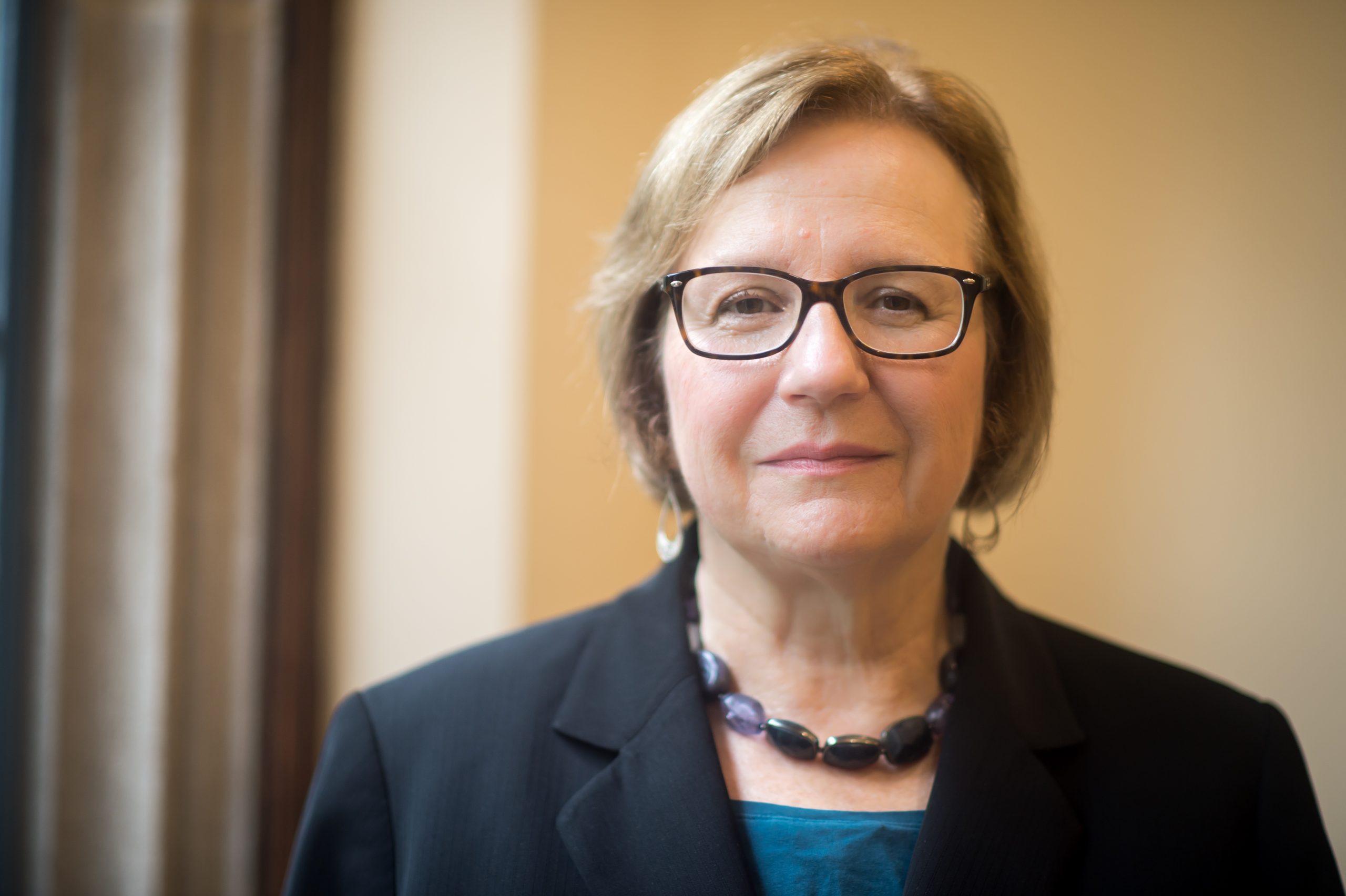[Christine Firer Hinze is Professor of Theological and Social Ethics, Chair of the Department of Theology, former Director of the Curran Center for American Catholic Studies at Fordham University, and president-elect of the Catholic Theological Society of America. Her teaching and research focus on foundational and applied ethics, especially the dynamics of social transformation, Catholic social thought, and economic and work justice for vulnerable women, families, and communities. She spoke to Charles Camosy about her latest book.]
Camosy: I know what it’s like for a book project to have a long and winding journey, and I’ve gathered that this is what it’s been like for your publication of Radical Sufficiency. Can you tell a little bit of this book’s story?
Hinze: As a Wisconsinite yourself, you’ll enjoy knowing that this project traces back to my time living in Wisconsin, where I and my husband were both working full time while raising young children; for three years in a commuting marriage while I taught at St. Norbert College in De Pere, and later living and teaching at Marquette University in Milwaukee. Coming from a working-class background (my paternal grandfather worked in the meat-processing industry in Cudahy, WI), I had always gravitated toward the struggles of the less-powerful, including non-elite working women, men, and families.
Modern Catholic social teaching and ethics is striking for its focus on the dignity of work and families, and on solidarity with and justice for the economically vulnerable. Living through my own experiences and observing the wider work and family challenges people were facing at the end of the 20th century, I became convinced that a fresh, critical perspective on Catholic social thought on work and family justice could have a lot to offer us today, and ever since then I have been thinking about the contours of a U.S. Catholic inflected work-family ethic, and how gender, class, race, and religion/spirituality connect to it.
A focus of the book is on Monsignor John A. Ryan, known to those of us who teach Catholic Social Teaching as a profession, but maybe less well-known outside of our circles. Could you say more about Ryan and why you choose to focus on him?
For anyone interested in Catholic social thought on work justice, especially in the U.S., the work of Ryan is a wonderful starting point. Though not a household name among Catholics today, John A. Ryan (1869-1945) was the most well-known and influential Catholic economic thinkers, public intellectuals, policy experts of the first half of the 20th century. The Minnesotan son of Irish immigrant farmers, one of 11 children, Ryan, as a young diocesan priest was sent to Washington D.C.’s Catholic University to study theology and economics, and wrote and published his dissertation, A Living Wage, in 1906.

Over the next three decades Ryan taught at CUA, worked for what would become the U.S. Bishops’ Conference (he was the writer behind the 1919 Bishops’ Program for Social Reconstruction), helped draft some of the first U.S. minimum wage legislation, was one of the charter members of the American Civil Liberties Union (ACLU), advised President Franklin Delano Roosevelt on labor policy, and spoke and published widely in both scholarly and popular venues.
As someone who was a passionate advocate for the ‘little guy’ in the halls of both the churches and the government, who articulated the holistic vision of Catholic social thought for the U.S. context of his day, who wed a reformist policy agenda with what he called a “sufficiently radical” vision of the social transformation that the gospel pointed toward, I found Ryan a great resource and starting point for thinking about inclusive work and family justice today.
As I show in the book, Ryan’s inductive method, his insistence on “sufficiency, security, and status” as a framework for the livelihood everyone is due, and his prescient critique of mass consumerism remain relevant and challenging in 2021. At the same time, Ryan’s entanglement in the racial and gender biases and misconceptions typical of his era both reflect the attitudes of white working-class Catholics during these decades and beyond, and illuminate areas that cry out for better responses by Catholics and their fellow U.S. citizens today.
A few years ago you sent me a fascinating article on Ryan’s resistance to the eugenic movement in the United States of the late-19th and early 20th Century. How do you think this was connected with Ryan’s overall vision?
Ryan was passionate about advancing and protecting the God-given dignity and rights of every one of God’s children, especially those vulnerable to exploitation or oppression by larger social, political, and economic forces and cultural trends. His thinking on what we might today call bio-ethical issues, in my view, was not as original or as publicly influential as his work in work and economic justice. But his suspicion and decrial of the eugenics movement (which among other things, advocated the use of birth control and sterilization to ‘weed out’ so called biologically or socially ‘inferior’ children or genetic traits) was not only completely in line with both his own and Catholic teachings’ convictions about protecting the lives and dignity of all God’s children (and about the limits of humans’ rights to ‘play God’ themselves in this arena). Ryan’s resistance to eugenics also foresaw the monstrous extremes to which this thinking could and later did lead in the Nazi regime, and in other regimes since.
OK, let’s get down to brass tacks here. What does “radical sufficiency” mean in our current context?
In 1919, Ryan expressed to a family member his belief and hope that his efforts to advance a Catholic social vision and ethic were not only practically-minded, but “sufficiently radical” to do justice to that vision’s gospel-based demands. Ryan also made the right of every worker and family to a dignified work that yields “sufficiency” – a dignified livelihood that provides enough for all – one of his centerpieces of his economic ethical and policy vision.
A century later, I argue that “radical sufficiency” must be the hallmark of a U.S. Catholic livelihood agenda adequate to the realities and needs of our time. By ‘radical’ I mean, we need a gospel – and science – grounded way of seeing our current circumstances that get to the spiritual and practical ‘roots’ of our continued failure to ensure good work and a decent livelihood to all. Our Catholic way of seeing, judging, and acting around economy and work is also radical for its scope – it presses us to really and truly include everyone.
To firmly and clearly claim that everyone should have access to enough through economic participation, and that no one should be excluded or prevented from participating, is a radical stance, and it challenges our currently dominant way of thinking and acting around markets, work, and economics. But if we are to put this conviction into practice, especially on our increasingly crowded, interconnected, and ecologically pressured planet, will demand that Catholics and all peoples get serious about embracing virtues of solidarity and sufficiency- the ability to identify and be satisfied with ‘enough.’ This is also a radical and very daunting demand – but for peopld of biblical faiths, our trust and hope in a God who is our ultimate, “Radical Sufficiency” can ground us in the risky venture of leaving our fears and comfort zones in order to cultivate a different society and a sustainable economy where we all are included and we all can attain sufficiency.
Do you also think Catholic Social Teaching can matter outside our academic seminar tables? What are some ways you could see it making a difference, for lack of a better way of saying it, in “real life”?
Catholic social teaching has so much to offer to the quest to educate people and build communities where life, liberty, and the pursuit of happiness are inclusive realities in our country and world today! One of the great things, as you well know, about this gospel-based body of thought and practice is that its core principles are meant to appeal to and resonate with not only members of the Catholic church, but all people of open minds and hearts and good will. So in on-the-ground campaigns for economic and work justice, claims like “no one who works full time should be in poverty,” make total sense from the perspective of both CST and U.S. ideals about justice, fairness, and equal opportunities for all.
One place CST can and does make a difference in real life today is among Catholics and local parish communities who get tuned into and animated by its vision. Some of these groups of Catholics in urban and rural areas across the country are joining with their neighbors in broad-based efforts to advance work and economic and political inclusion and justice for vulnerable families, workers, and historically marginalized or shortchanged communities. The real-life impacts of CST can be increased exponentially as more Catholics have the opportunity to learn and get excited about this dimension of their faith tradition’s ‘treasure trove.’
As we both know, there are lots of debates and fights about how to prioritize and put into practice core CST principles like the life and dignity of all persons, economic and worker rights, the preferential option for the vulnerable, etc. But CST offers even groups who disagree politically and economically a set of non-negotiable principles and guideposts by which people can recognize their common values across differences, and to which we can hold ourselves accountable as we try to grapple with what it means to protect human dignity and advance justice and the common good at all levels: Personal, family, community, and policy. Taking advantage of the leadership provided by, most recently, Pope Francis, maybe we should be asking how Catholic colleges and universities can help our local churches and church institutions to redouble efforts to spread the good news and put the empowering resources of the church’s social tradition into the hands and hearts of everyday Catholics.












